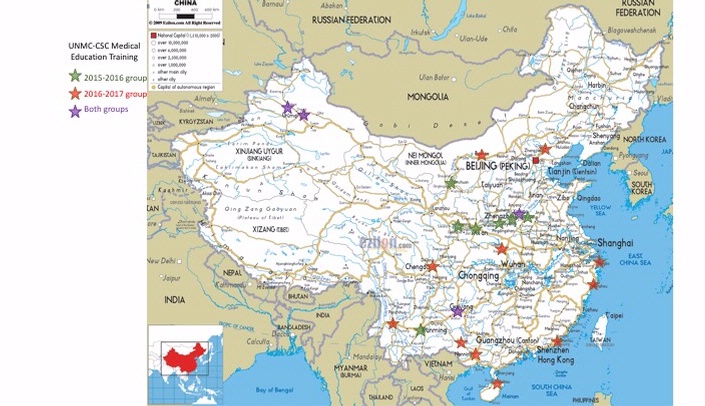On December 12, 15 faculty medical education trainees completed their six-month training at UNMC. This was the third cohort to study at UNMC with the support of the China Scholarship Council.
This group came from 15 different universities, located in 12 different provinces. Several of these universities have sent participants this year and last year, suggesting that the training has been popular with faculty there. At the same time, ten universities from eight provinces are new to the program this year, which means that the impact of the program is growing, and along with it, recognition of UNMC in China.
Though the faculty came from many regions of China, they were united in their reason for coming: improving their teaching methods and techniques, course design, evaluation and assessment skills, and the overall medical education curriculum at their home institutions.
For some, this meant moving away from passive learning. Yan Lin, Ph.D., Shantou University Medical College, said "in China we need to change from lectures to student-centered teaching. For this, we have learned a lot of effective techniques from UNMC’s faculty. I especially want to thank Dr. Richard MacDonald, who taught me how to effectively set up and facilitate problem-based learning sessions."
Despite the benefits, the trainees will need to make adjustments to fit the curriculum to China. Jingxuan Zhang, Ph.D., Hubei University of Medicine, said "UNMC’s program is wonderful. Of course, education is different in the US and China, students are different, and the environment is different, so we will need to make some changes before we implement these ideas."
Keith Swarts, Interim Director of the Asia Pacific Rim Development Program, said "this training program expands UNMC’s medical education techniques throughout China. The goal is to ‘train the trainers’ who will prepare the next generation of Chinese physicians and faculty. This puts the burden on the trainees to take these experiences back to their institutions and change the face of health care in China. It will be difficult, but after meeting all of them and hearing their experiences here, I am confident that they will be successful."
This year the program was extended from three to six months. "The program has been very well received in China, so they asked for more time to study pedagogy at UNMC. Additionally, the program itself is very popular. More than 100 faculty members have applied to come to UNMC for it," said Zenghan "Hannah" Tong, Ph.D., Interim Associate Director of the Asia Pacific Rim Development Program. "This program helps us explore collaborative opportunities with different universities in China."
Also, the program has been expanded within UNMC to include the College of Public Health as well as the College of Medicine.
This group left Omaha on Sunday (12/18), but they took many memories (and some of UNMC’s most effective educational techniques!) with them. The spring group of trainees is set to arrive in late December.
